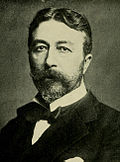November 5, 1901 | |||||||||||||||||
| |||||||||||||||||
 County results Murphy: 40–50% 50–60% 60–70% Seymour: 50–60% | |||||||||||||||||
| |||||||||||||||||
| Elections in New Jersey |
|---|
 |
The 1901 New Jersey gubernatorial election was held on November 5, 1901. Republican nominee Franklin Murphy defeated Democratic nominee James M. Seymour with 50.88% of the vote.

